Available - Katalog Lampen - Photo gallery
Image database with photographs of ancient art and antiquities
Our image database provides photographs of ancient art and antiquities for press releases as well as for private use. All artefacts sold in our gallery are documented through professional photographs. The resulting image library contains numerous ancient Egyptian, Greek and Roman antiquities as well as ancient coins. The time span from Stone Age, over Bronze Age and Classical Antiquity until Late Antiquity is covered.The photo gallery aims at providing a vast visual archive equipped with filters and search tools. You are most welcome to search the constantly growing number of artefacts in the image library. We are also happy to authorize hyperlinks from your webpage / forum to the objects depicted in our gallery. For this purpose, please send us a short notification prior to placing a hyperlink. For almost every object high definition photographs are available and can be provided e.g. to document your collection or for scientific papers or popular science articles. If you are interested in using pictures for publications, print media or other purposes, please contact us and we will be happy to assist you.
-
 Hellenistic gold diadem
Hellenistic gold diademMagnificent head-dress in the shape of a pediment from the time of Alexander the Great. Embossed with a floral decoration, supplemented by birds and grasshoppers. This piece has been published in a 1965 standard work on hellenistic gold jewellery.
 Egyptian statuette of Harpocrates
Egyptian statuette of HarpocratesThe bronze figurine of excellent quality depicts the child god with cornucopia and double crown. From the Ptolemaic Period of ancient Egypt.
 Stamp seal with handle
Stamp seal with handleInteresting Iron Age II seal with schematically engraved animals and humans. The seal is from southern Anatolia or northern Syria.
 Egyptian faience statuette of a baboon
Egyptian faience statuette of a baboonThe small work of art dates to the Late Period of ancient Egypt. It is worthy to be displayed at a major museum. Published in two works on the famous Epstein collection.
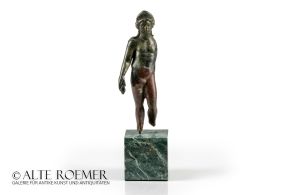 Roman bronze Apollo Kitharoidos - ex Christie's
Roman bronze Apollo Kitharoidos - ex Christie'sImpressive, very aesthetic figure. Excellently preserved with beautiful patina. Mounted on modern green marble base.
 Roman glass juglet with trailing
Roman glass juglet with trailingThe elegant vessel is a magnificent example of the mature art of glass making in the Roman Empire during Late Antiquity. From the collection of the well-known archaeologist Professor Fritz Fremersdorf.
 Old Babylonian cylinder seal with gods
Old Babylonian cylinder seal with godsSeal of reddish brown stone from the Middle Bronze Age of Mesopotamia. It shows three standing deities, one with the shepherd's staff of Amurru.
 Italic bronze belt of a warrior
Italic bronze belt of a warriorStunning samnite bronze work from South Italy. Made in the 5th or 4th century BC, before Romes expansion into Italy. From the famous Guttmann collection.
 Italic bronze belt of a warrior
Italic bronze belt of a warriorNice samnite bronze work from South Italy. Made in the 4th century BC, before Romes expansion into Italy. From the famous Guttmann collection.
 Core-formed polychrome glass alabastron
Core-formed polychrome glass alabastronNice and small vessel with a strong patina. It is not a classical type of alabastron and retains a few mysteries.
 Sword of the Urnfield culture from a museum collection
Sword of the Urnfield culture from a museum collectionWonderfully preserved bronze weapon from the time around 1000 BC. It was made in Central Europe by the Urnfield culture and formed part of a museum collection for almost 70 years.
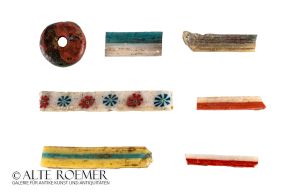 Mosaic glass inlays and spindle whorl
Mosaic glass inlays and spindle whorlNice group of polychrome inlays and a spindle weight from Roman Egypt. Including one fragment with a wonderful floral decor.
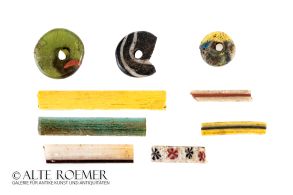 Mosaic glass inlays and spindle whorls
Mosaic glass inlays and spindle whorlsNice group of polychrome inlays and spindle weights from Roman Egypt. Including one fragment with a wonderful floral decor.
 Mesopotamian libation bowl
Mesopotamian libation bowlAlabaster vessel with ram's head as a spout for the offering. A perfectly preserved piece from the 3rd Millennium BC.
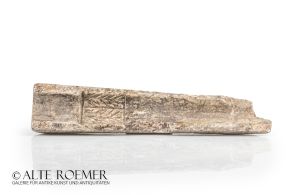 Bronze Age casting mould for a chisel
Bronze Age casting mould for a chiselOne half of a stone mould for bronze casting. The equipment is from a workshop of the 2nd Millennium BC, probably from the Carpathian Basin. From the famous Guttmann Collection. This mould was published in a work by Born and Hansen.
 Bronze Age casting mould for a lance head
Bronze Age casting mould for a lance headOne half of a stone mould for bronze casting. The equipment is from a workshop of the 2nd Millennium BC, probably from the Carpathian Basin. From the famous Guttmann Collection. This mould was published in a work by Born and Hansen.
 Predynastic beaker with black top
Predynastic beaker with black topA perfect example of the highly distinctive black-topped ware from the Naqada I and II culture. The tall jar is impressively well preserved.
 Egyptian scarab
Egyptian scarabThe scarab is made of nice marbled stone. Schematical upper side, structured, unengraved bottom side. From the Late Period of Ancient Egypt.
 Egyptian faience statuette of Taweret
Egyptian faience statuette of TaweretTypical depiction of the protective goddess for pregnant women. A piece of superior quality and great detail. From the Late Period of Ancient Egypt.
 Corinthian aryballos in the form of a ram
Corinthian aryballos in the form of a ramBeautiful small vessel for perfumed oil from the heyday of Corinthian pottery production, at the beginning of the 6th century BC.
 Roman appliqués of Sol Invictus and Luna
Roman appliqués of Sol Invictus and LunaEnsemble of two nice terra cotta examples of the cult around the Roman sun god and moon goddess in Roman Imperial times.
 Egyptian headrest for a funeral or daily use
Egyptian headrest for a funeral or daily useThe well-preserved wood object is a rare example for this funenary ritual. The high quality piece was made around the Amarna Period in the late 18th dynasty of ancient Egypt.

 Mochica stirrup vessel of a dignitary
Mochica stirrup vessel of a dignitaryImposing Peruvian vessel shaped like a man with cloak in his hands. Circa 100 to 500 AD. Exhibited multiple times and published.
 Islamic glass flask
Islamic glass flaskSlender glass flask from the Golden Age of Islam. With a nicely shaped handle and a wonderful, subtle patina. Ex-Sotheby's.
 Rare byzantine oil lamp with eight nozzles
Rare byzantine oil lamp with eight nozzlesDecorated with two crosses and a dove. From old french private collection, eEported with permit of the french Ministère de la Culture Nr. 224923.
 Mochica stirrup vessel in falcon shape
Mochica stirrup vessel in falcon shapeSmall vessel from the golden age of the Moche culture. It is shaped like a falcon with painted on details. Including certificate from 1984.
 Islamic glass flask
Islamic glass flaskBulbous flask from the Golden Age of Islam. Made of beautiful reddish brown glass. Ex-Sotheby's.
 Stirrup vessel in squash shape
Stirrup vessel in squash shapeGreat example of the intricately designed vessels of the Peruvian Chimú culture, decorated with a monkey and birds. The squash was an important fruit in the pre-Columbian Kingdom of Chimor.
 Corinthian aryballos in the form of a hare
Corinthian aryballos in the form of a hareBeautiful small vessel for perfumed oil from the heyday of Corinthian pottery production, made around 600 BC.
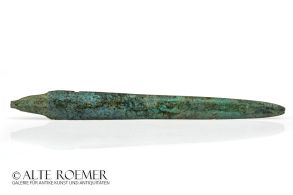 Large Near Eastern lance head
Large Near Eastern lance headDouble-edged blade of a lance from Bronze Age. With a nice green patina.
 Akkadian cylinder seal with animal contest
Akkadian cylinder seal with animal contestThe cylindrical seal from Mesopotamia shows domesticated animals fighting with lions and a bull-man. An impressively large piece for a cylinder seal. Old Akkadian, around 2300 BC.
 Near Eastern cylinder seal with fish
Near Eastern cylinder seal with fishThe beige seal shows three groups of stylized fish. Am artefact from Bronze Age Mesopotamia or south-west Iran.
 Extremely fine Julius Caesar denarius
Extremely fine Julius Caesar denariusNice patina. Ex NAC Zürich, auction 25, 2003. Most likely minted to pay Caesar's troops after the victory at the Battle of Thapsus (North Africa, modern Tunis).
 Roman glass bottle with beautiful colour bands
Roman glass bottle with beautiful colour bandsA colourful ancient glass from the early 1st century. Made in the Eastern Mediterranean.
 Glass double unguentarium
Glass double unguentariumImpressive cosmetic vessel with large handle and nice spiral trailing decoration. A Palestinian type from the Late Roman or Early Byzantine period.

